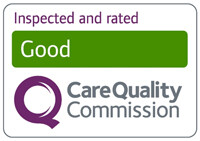Coronavirus (COVID-19) Get information about Coronavirus on NHS.UK
Home » Self-Help and Patient Information » COPD
Self-Help: COPD
COPD
Chronic obstructive pulmonary disease (COPD) refers to a group of lung conditions that cause breathing difficulties. These include emphysema, a condition in which there is damage to the air sacs in the lungs, chronic bronchitis where a lot of phlegm production occurs almost daily. It is a common condition that mainly affects middle-aged or older adults who smoke or have smoked a significant amount in the past
COPD causes narrowing of the airways, and people with COPD may find breathing more difficult. They may also have symptoms such as breathlessness when exercising, a persistent chesty cough with phlegm, wheezing and frequent chest infections
COPD annual review
COPD is a condition that can worsen over time. Although there is no cure for COPD, there are medicines that can help slow the progression of the condition and help keep symptoms under control. People with COPD should have a review with their COPD nurse at least once a year. This is an opportunity to discuss your symptoms, any concerns you may have with your condition and discuss how to use your medication and any changes that may be needed. The COPD nurse will assess the severity of your symptoms, review any medication and discuss inhaler technique. Your COPD nurse will also discuss if a referral for pulmonary rehabilitation is needed. Pulmonary rehabilitation refers to a specialised programme of group exercise and education sessions to help people with COPD improve daily activities without getting breathless. There are also exercises that you can do at home. Exercise is proven to help slow down the progression of COPD.
Your COPD nurse will also discuss a self-management plan giving information about your medication and what to do if your condition gets worse or if you develop an infection. If you are having a face to face review, the COPD nurse may also do a small breathing test to see if there has been any progression of your COPD.
COPD Assessment Test (CAT)
To complete the assessment please visit:
https://www.mmpmedical.com/give-us-your-clinical-data/copd-assessment-test-cat/
Other things you can do to keep well
- Stopping smoking. It is never too late for this to be beneficial. Smoking-cessation services have been shown to be the most effective way to stop smoking. This can reduce your risk of developing other conditions such as heart disease, COPD and cancer.
Please contact the surgery to book an appointment with the nurse for smoking cessation advice.
- Increase your daily exercise if needed. Birmingham City Council has produced a useful leaflet highlighting a number of useful exercise schemes throughout Birmingham: https://www.birmingham.gov.uk/downloads/file/8106/lifestyles_leaflet
- Maintain a healthy weight. Weight loss if your BMI is greater than 25.
- Have a flu vaccine every year. Contact your GP or practice nurse for an appointment.
- Have a pneumococcal vaccine. This only needs to be given once.
- Practice your inhaler technique with your practice nurse
- In cold weather make sure you have enough indoor heating, and wrap up warmly when outside ensuring that you wear a light weight scarf coverinyour mouth as this wil help your breathing and also wear a hat !
- Make sure you have your reliever inhaler with you and use it about five to ten minutes before you do anything that you know causes you to be breathless such as inclines or stairs
- Maintain a healthy diet and eat a balanced diet.
- Avoid sedatives or too much alcohol. These can worsen your breathing.
COPD and Coronavirus
It is important that people experiencing any immediate concerns with their COPD or lung condition should get in contact with their GP or NHS 111, or 999 in an emergency
For general advice about coronavirus for patients with chronic lung conditions, please follow: https://www.blf.org.uk/support-for-you/coronavirus
The British Lung Foundation offer an independent general advice helpline on 03000 030555 available Monday to Friday, 9am – 5pm.
The following questionnaire can help you and your healthcare professional measure how much impact your COPD is having on your daily life. It is important that people experiencing any immediate concerns with their COPD or lung condition should get in contact with their GP or NHS 111, or 999 in an emergency.
Further Information:
https://www.nhs.uk/conditions/chronic-obstructive-pulmonary-disease-copd/living-with/
The NHS website has also produced myCOPD app available from the Digital Apps Library – a tool to help you better manage your COPD.

